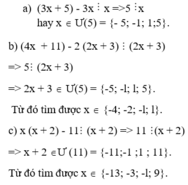bài 62: tìm x thuộc z sao cho :
a, 3x+2chia hết cho x-1
b, x^2+2x -7 chia hết cho x+2
Hãy nhập câu hỏi của bạn vào đây, nếu là tài khoản VIP, bạn sẽ được ưu tiên trả lời.

\(3x+2⋮x-1\)
\(\Leftrightarrow3\left(x-1\right)+5⋮x-1\)
\(\Leftrightarrow5⋮x-1\)
\(\Leftrightarrow\left(x-1\right)\inƯ\left(5\right)\)
\(\Leftrightarrow\left(x-1\right)\in\left\{\pm1;\pm5\right\}\)
\(\Leftrightarrow x\in\left\{-4;0;2;6\right\}\)
Vậy để \(3x+2⋮x-1\) thì \(x\in\left\{-4;0;2;6\right\}\)
b) \(x^2+2x-7⋮x+2\)
\(\Leftrightarrow x\left(x+2\right)-7⋮x+2\)
\(\Leftrightarrow7⋮x+2\)
\(\Leftrightarrow\left(x+2\right)\inƯ\left(7\right)\)
\(\Leftrightarrow\left(x+2\right)\in\left\{\pm1;\pm7\right\}\)
\(\Leftrightarrow x\in\left\{-9;-3;-1;5\right\}\)
Vậy để \(x^2+2x-7⋮x+2\) thì \(x\in\left\{-9;-3;-1;5\right\}\)

a, x+3 chia hết cho x-1
Ta có: x+3=(x+1)+2
=> 2 chia hết cho x+1
=>x+1 thuộc Ư(2)= {1, -1, 2, -2}
=> x thuộc {0,-2, 1, -3}
b.
b,3x chia hết cho x-1
c,2-x chia hết cho x+1
Ta có:
\(\dfrac{x+3}{x-1}=\dfrac{x-1+4}{x-1}=1+\dfrac{4}{x-1}\)
Để (x + 3) \(⋮\left(x-1\right)\) thì 4 \(⋮\left(x-1\right)\)
\(\Rightarrow\) x - 1 = 1; x - 1 = -1; x - 1 = 2; x - 1 = -2; x - 1 = 4; x - 1 = -4
*) x - 1 = 1
x = 2
*) x - 1 = -1
x = 0
*) x - 1 = 2
x = 3
*) x - 1 = -2
x = -1
*) x - 1 = 4
x = 5
*) x - 1 = -4
x = -3
Vậy x = 5; x = 3; x = 2; x = 0; x = -1; x = -3

b) \(3x+9=3x+6+3=3\left(x+2\right)+3⋮\left(x+2\right)\Leftrightarrow3⋮\left(x+2\right)\)
\(\Leftrightarrow x+2\inƯ\left(3\right)=\left\{-3,-1,1,3\right\}\Leftrightarrow x\in\left\{-5,-3,-1,1\right\}\).
a), c) tương tự.
d) \(\left(2x+1\right)⋮\left(3x-1\right)\Rightarrow3\left(2x+1\right)=6x+3=6x-2+5=2\left(3x-1\right)+5⋮\left(3x-1\right)\)
\(\Leftrightarrow5⋮\left(3x-1\right)\Leftrightarrow3x-1\inƯ\left(5\right)=\left\{-5,-1,1,5\right\}\Leftrightarrow x\in\left\{0,2\right\}\)(vì \(x\)nguyên)
Thử lại đều thỏa mãn.

6 \(n^5+5n=n^5-n+6n=n\left(n^4-1\right)+6n=n\left(n^2-1\right)\left(n^2+1\right)+6n\)
\(=n\left(n-1\right)\left(n+1\right)\left(n^2+1\right)+6n\)
vì n,n-1 là 2 số nguyên lien tiếp \(\Rightarrow n\left(n-1\right)⋮2\Rightarrow n\left(n-1\right)\left(n+1\right)\left(n^2+1\right)⋮2\)
n,n-1,n+1 là 3 sô nguyên liên tiếp \(\Rightarrow n\left(n-1\right)\left(n+1\right)⋮3\Rightarrow n\left(n-1\right)\left(n+1\right)\left(n^2+1\right)⋮3\)
\(\Rightarrow n\left(n-1\right)\left(n+1\right)\left(n^2+1\right)⋮2\cdot3=6\)
\(6⋮6\Rightarrow6n⋮6\Rightarrow n\left(n-1\right)\left(n+1\right)\left(n^2+1\right)-6n⋮6\Rightarrow n^5+5n⋮6\)(đpcm)
7 \(n\left(2n+7\right)\left(7n+1\right)=n\left(2n+7\right)\left(7n+7-6\right)=7n\left(n+1\right)\left(2n+7\right)-6n\left(2n+7\right)\)
\(=7n\left(n+1\right)\left(2n+4+3\right)-6n\left(2n+7\right)\)
\(=7n\left(n+1\right)\left(2n+4\right)+21n\left(n+1\right)-6n\left(2n+7\right)\)
\(=14n\left(n+1\right)\left(n+2\right)+21n\left(n+1\right)-6n\left(2n+7\right)\)
n,n+1,n+2 là 3 sô nguyên liên tiếp dựa vào bài 6 \(\Rightarrow n\left(n+1\right)\left(n+2\right)⋮6\Rightarrow14n\left(n+1\right)\left(n+2\right)⋮6\)
\(21⋮3;n\left(n+1\right)⋮2\Rightarrow21n\left(n+1\right)⋮3\cdot2=6\)
\(6⋮6\Rightarrow6n\left(2n+7\right)⋮6\)
\(\Rightarrow14n\left(n+1\right)\left(n+2\right)+21n\left(n+1\right)-6n\left(2n+7\right)⋮6\)
\(\Rightarrow n\left(2n+7\right)\left(7n+1\right)⋮6\)(đpcm)
......................?
mik ko biết
mong bn thông cảm
nha ................

Bài 1:
a: \(\Leftrightarrow x-1\in\left\{1;-1;3;-3\right\}\)
hay \(x\in\left\{2;0;4;-2\right\}\)

a: 3x^3+2x^2-7x+a chia hêt cho 3x-1
=>3x^3-x^2+3x^2-x-6x+2+a-2 chia hết cho 3x-1
=>a-2=0
=>a=2
c: =>2x^2-6x+(a+6)x-3a-18+3a+19 chia x-3 dư 4
=>3a+19=4
=>3a=-15
=>a=-5
d: 2x^3-x^2+ax+b chiahêt cho x^2-1
=>2x^3-2x-x^2+1+(a+2)x+b-1 chia hết cho x^2-1
=>a+2=0 và b-1=0
=>a=-2 và b=1


a: =>3x-3+5 chia hết cho x-1
=>x-1 thuộc {1;-1;5;-5}
=>x thuộc {2;0;6;-4}
b: =>x(x+2)-7 chia hết cho x+2
=>x+2 thuộc {1;-1;7;-7}
=>x thuộc {-1;-3;5;-9}